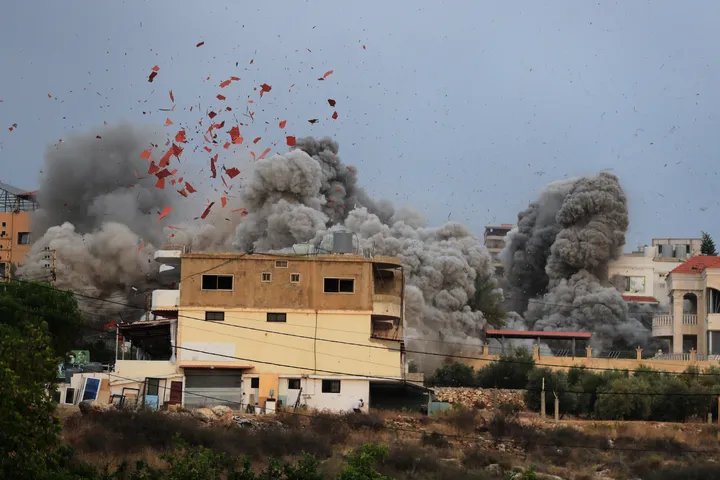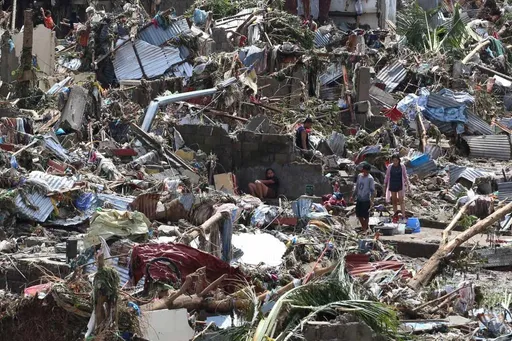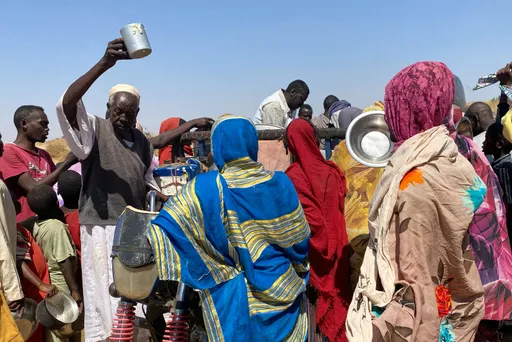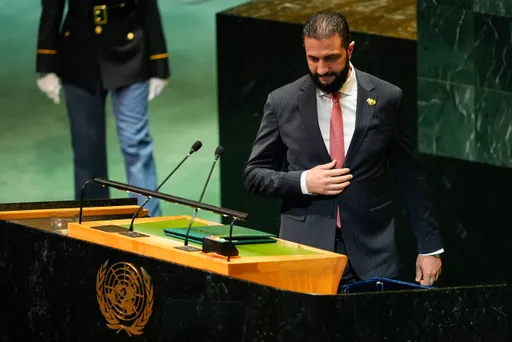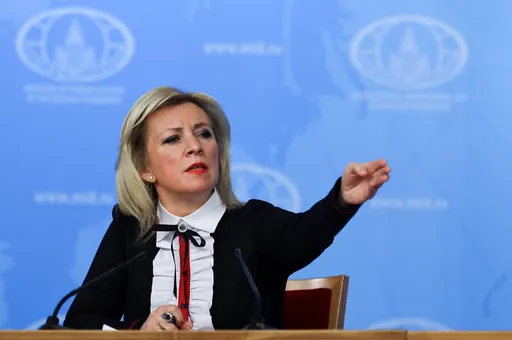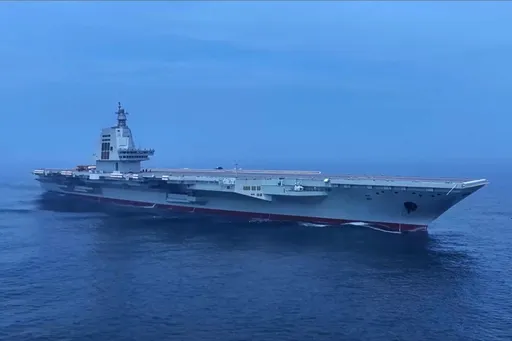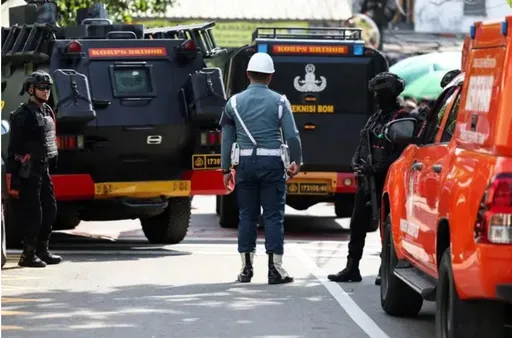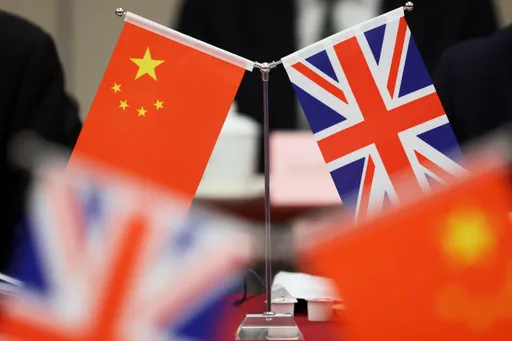Thousands of relatives, war veterans and residents poured into the Martyrs’ Graveyard in the Azerbaijani city of Ganja on a recent morning to commemorate the Second Karabakh War, which started on September 27, 2020, and became a preamble for Baku’s triumph over neighbouring Armenia.
They arrived in ones and twos, in black suits and gowns and military uniforms, carrying red flowers as they passed through a wall with framed pictures of fallen soldiers. Among them many school children, they made their way to the Memorial of Martyrs, a yellow stone monument with a fire perpetually burning in between two tall columns since the skirmishes started in the 1990s.
Mothers and wives wept and kissed pictures of the men who left their homes to fight a war that received spasmodic and often conflicting media coverage for most of the three decades following the Armenian occupation of Karabakh in the early 1990s.
“My son was killed in a battle near Lachin in 1992. It was either homeland or death,” said Huseyinov Mehman Kamiloglu, 86, one of many who had come to the graveyard to take part in commemoration ceremonies.

Thousands of Azerbaijanis lost their lives fighting to reclaim Karabakh over the decades. (TRT World)
Thousands of Azerbaijanis soldiers have been killed in at least three wars over the Karabakh region, a territory internationally recognised as a part of Azerbaijan.
Armenian separatists occupied the region for three decades. Last month, Azerbaijani military took complete control of the region after a lightning-fast operation that lasted less than 24 hours.
Most Azerbaijanis have a common reservation towards Western media organisations. They feel their long-standing sacrifices and sufferings are being ignored while much of the media focus is being shifted towards Karabakh’s Armenian residents, who have opted for a voluntary migration to Armenia.
“On December 24, 1991, we were forcibly expelled from our village by the Armenians. That was our ancestral land. We were left with nothing,” said Recepov Imran Kamranoglu, referring to the Qazanli village in Karabakh’s Khojali district, which for years was under Armenian occupation.
“A man from every other house was killed in our village in the fighting during that time.”
Years later, Kamranoglu joined the Azerbaijan military and took part in the Second Karabakh War. The battles to take back the region weren’t easy.
“You didn’t know what’s going to happen 5 metres from where you are standing on the battlefield. But the most difficult thing was to see your comrades falling around you.”
During the 44-day war in 2020, the Armenian military targeted civilian neighbourhoods in Ganja, a city located in western Azerbaijan, with Tochka (OTR-21) ballistic missiles and Smerch rockets, killing 26 Azerbaijani civilians and injuring more than 140 others.
Fifteen-year-old Sahin Aliyev was a witness to that massacre.
“I was sleeping. There was a loud bang and all the windows in our house shattered. I came running to see what had happened. There was chaos. I had never seen anything like it,” said Aliyev.
“There was a small boy who was pulled out of the rubble. He looked so confused like he had lost his mind.”

Armenia hit civilians in Azerbaijan's Ganja city during the Second Karabakh War, killing more than two dozen people. (TRT World)
After achieving complete air dominance in the 2020 war, thanks to the Turkish drones, several key towns such as Shusha, a mountainous valley overseeing Karabakh’s capital Khankendi came under Baku's control.
A road newly constructed by the Azerbaijani government, called the Victory Road, winds its way up the green, blue and brown-hued mountains to reach Shusha, around 390 km from Baku, Azerbaijan’s capital. Every now and then, Soviet-era Kamaz trucks and Lada cars appear sputtering on the incline.
Prior to the Armenian occupation in the early 1990s, Shusha was a thriving town with a majority Azerbaijani population. The initial years of siege laid by Armenian separatists completely destroyed the town, forcing the Azerbaijani population to leave their homes and move to mainland Azerbaijan. What remains of Shusha now are moss-covered brick walls of abandoned homes and trenches on a hill that for more than two years was the frontline between Azerbaijani military and the Armenian separatists.
The displacement that took place in Shusha, Aghdam and other Azerbaijani towns after they fell into the hands of Armenian separatists is once again in the spotlight as experts say the Armenian diaspora in the US and elsewhere has propagated a skewed narrative, portraying themselves as victims and Azerbaijanis as aggressors while completely erasing the history of dehumanisation and mass violence against Azerbaijanis.
“They are constantly on different platforms stressing and underlying that Christian Armenians are facing a genocidal policy of Azerbaijan,” says Fuad Chiragov, Deputy Director at the Center for Studies of the South Caucasus, a Baku-based think-tank.
“At the same time, they don’t talk about how many mosques were destroyed in the region.”
Chiragov says Baku has handled Karabakh’s capture deftly, without giving Yerevan and its supporters any opportunity to attack Azerbaijan’s conduct.
At the Lachin borden crossing, thousands of Armenian residents of Karabakh are driving over to the other side, leaving with their belongings packed in cars and trucks, without any hindrance and customary checking of documents. Azerbaijani President Ilhan Aliyev has assured Armenian residents equal rights if they decide to stay back and integrate into the Azerbaijani society.

A flame has continuously burned for years at a memorial which stands in Martyrs' Graveyard in the Ganja city in memory of the fallen Azerbaijani soldiers. (TRT World)
The United Nations this week said it hasn’t found any evidence of Armenian civilians of Karabakh getting hurt.
For Azerbaijan, Karabakh was a festering wound, which over the years instilled an unflinching determination among its people to take back the territory. Drive hundreds of kilometres from Baku and it’s not uncommon to come across a roadside hoarding announcing “Karabakh is Azerbaijan”.
After re-taking Karabakh, the Azerbaijani military seized hundreds of rifles, thousands of bullets, missiles and armoured vehicles from the separatists that Baku says were smuggled in from Armenia.
Despite a bitter history, many Azerbaijanis are calling for peace, reminiscing about the time when both communities in Karabakh lived together in harmony. Among them is 54-year-old Eskerova Sitare, a resident of Ganja.
In 1991, Sitare was pregnant when she learned her husband lost his life fighting on the frontline. “That was a terrible time for me. I was only 21 and asked him not to go. But he’d say he had to fight for his family, his children.”
Less than three weeks later she was informed that her brother, who was also participating in the First Karabakh War, had also been killed in action.
“Now, I don’t want our young men to die and I don’t want Armenian youth getting killed either.”


